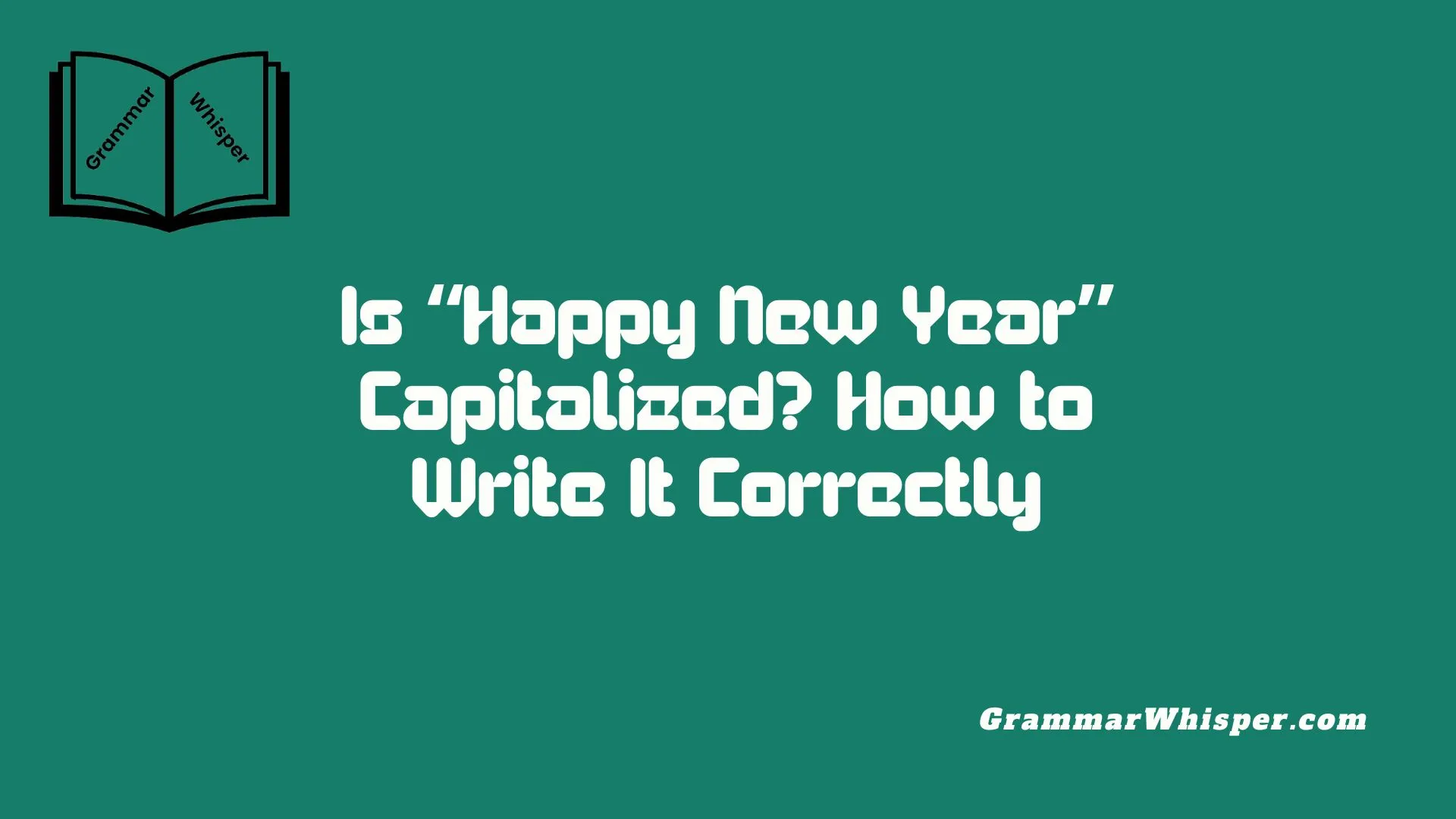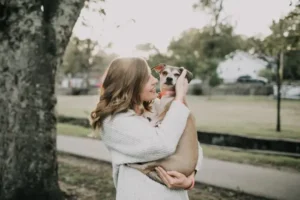Each holiday season, we share greetings on cards, in emails, and through casual texts. For writers, even the most seasoned ones, tiny details like grammar and punctuation often cause second thoughts. Do you capitalize “Happy New Year“? Without a doubt – especially in formal messages or when it’s the first part of a sentence. In my own experience helping others write well-crafted notes, that small capital makes the message feel more warm, polished, and truly professional.
When you’re sending a message, it’s not just about sounding joyful – it’s about intent. Good writing shows you care. Taking time to format your note correctly shows a deeper understanding of how tone and clarity matter. And yes, the way your words feel when read can set you apart. Readers remember when something is written with genuine attention to detail.
Understanding Holiday Capitalization Rules
Working in publishing for years taught me one clear truth: holiday greetings follow rules – and mixing them up can make your writing look sloppy. At the heart of it is a simple concept: capitalize proper nouns and titles, but don’t overdo it.
In greetings like:
- Happy New Year
- Merry Christmas
- Happy Thanksgiving
…each word is part of a fixed phrase or title, so they all get capitalized. However, when you talk about a new year in general, those words don’t need uppercase. Consider this example:
“We’ll meet in the new year to finalize the project.”
Here, new year refers to time – not a holiday – so keep it lowercase. It’s a subtle shift, but knowing it gives your writing a professional edge.
The Grammar Behind “Happy New Year”
Let’s break it down grammatically: Happy serves as an adjective, and New Year functions as a proper noun. When these words form part of a titled greeting, you capitalize each component. Here’s how that plays out:
| Phrase Type | Example | Capitalization |
| Holiday Greeting Title | Happy New Year | Go with capitals |
| Casual Reference | wishing you a happy new year | lowercase daylight |
So yes, write Happy New Year if it stands on its own – or starts a sentence. Use lowercase when it’s a part of running text and not a formal greeting.
Is “New Year” Always a Proper Noun?
If that table still leaves you wondering, don’t worry – you’re not alone. People often ask: “Is New Year a proper noun every time?”
The answer is: only when it refers to the holiday or a specific event. That means capitalize it New Year in:
- Happy New Year!
- New Year’s Eve
- New Year’s Day
But use lowercase new year when talking generally about the coming year:
“In the new year, we’ll focus on growth.”
Clarity comes down to context. Treat it like any other proper noun – capitalize titles, not casual mentions.
Style Guides on Capitalizing “Happy New Year”
When it comes to style, what do the big guns say?
Chicago Manual of Style:
- They treat holiday greetings like titles – capitalize fully.
- They recommend Happy New Year to you all as a proper phrase.
AP Stylebook:
- They capitalize New Year’s Day and New Year’s Eve.
- They allow lowercase new year when referring to the calendar year broadly.
Merriam-Webster & Oxford:
- Their dictionaries show New Year as the holiday.
- They list new year (lowercase) as the “first day” or “period after” January 1.
This means you’re safe to capitalize Happy New Year and New Year’s Eve/Day, while dropping caps for more general uses.
“New Year’s” or “New Years”: The Apostrophe Debate
Apostrophe use around New Year’s confuses a surprising number of people. Let me clear it up:
- New Year’s Eve and New Year’s Day are correct.
- You’re celebrating the Eve/Day of the New Year, so the apostrophe marks possession.
- Do not write New Years Eve without an apostrophe.
Meanwhile:
new years of experience doesn’t refer to a holiday – it refers to years gained, so no apostrophe.
When Not to Capitalize “Happy New Year”
It’s easy to assume that Happy New Year is always capitalized – but grammar doesn’t always follow intuition. There are moments where capitalization isn’t just unnecessary – it’s incorrect.
Here are common cases when to skip the capital letters:
- Mid-sentence use in casual conversation He wished me a happy new year before leaving.
- Text messages and social media blurbs Hope you have a happy new year, fam! (Yes, it’s lowercase unless it starts the sentence.)
- Non-holiday references to the general year Let’s try again in the new year.
Quick Rule of Thumb:
If you’re using it as a formal greeting or referring to the holiday title – capitalize it. If it’s just about the passage of time – don’t.
Other Holiday Greetings: Capitalization Rules You Should Know
While we’re focusing on Happy New Year, many other holiday greetings follow similar rules. Here’s a quick reference for other major celebrations:
| Holiday Phrase | Capitalize? | Notes |
| Merry Christmas | ✅ Yes | Capitalize both words in greetings |
| happy holidays | ❌ No | Only capitalize “happy” if it begins a sentence |
| Season’s Greetings | ✅ Yes | Fixed expression – capitalize both |
| happy birthday | ❌ No | Unless it’s in a formal title or starts a sentence |
| Happy Easter | ✅ Yes | “Easter” is a proper noun |
| Happy Thanksgiving | ✅ Yes | Formal greeting – capitalize each word |
| happy new year (general) | ❌ No | Lowercase in informal or mid-sentence usage |
Notice the trend? When a greeting is standalone or part of a proper title, use uppercase. Otherwise, default to sentence-level capitalization rules.
Correct Usage in Digital and Printed Greetings
With the rise of virtual communication – emails, texts, digital invites – it’s more important than ever to get your greetings right. Whether you’re designing eCards or sending company newsletters, small grammar details shape how your message is received.
Here’s how to format your holiday greetings:
Formal (corporate email, printed card):
Subject line: Happy New Year from the [Company Name] Team Body: We wish you and your family a Happy New Year filled with joy, health, and success.
Informal (texts, DMs, captions):
had a wild year. hope u have a happy new year! 🎉
Pro Tip: Even on social media, proper capitalization can boost engagement and credibility – especially if you’re a brand or public figure.
Special Events: Capitalizing “New Year’s Eve,” “New Year’s Day,” and More
The phrase New Year’s Eve is often confused with New Year’s Day, and both get twisted into awkward versions like “new years” or “new years day.”
Here’s how to remember the correct forms:
| Event | Correct Form | Notes |
| Eve of the new year | New Year’s Eve | Capitalized & possessive |
| First day of the year | New Year’s Day | Same rules – capitalize both |
| Talking generally | new year’s goals | lowercase if not a named event |
| Plural experience phrase | new years | No apostrophe (e.g., “new years of growth”) |
Example Usage:
- Correct: She’s hosting a party on New Year’s Eve.
- Incorrect: She’s hosting a party on new years eve. ❌
- Correct: I’ll share my goals for the new year tomorrow.
The Difference: “New Year” vs. “new year”
Let’s simplify this once and for all:
Capitalized: “New Year”
Use when:
- Referring to the holiday
- Part of a formal greeting
- Stating the name of the event
“We’re celebrating the New Year in Tokyo.”
Lowercase: “new year”
Use when:
- Referring to a general time period
- Mentioning resolutions, goals, or plans
“I’ve set a few goals for the new year.”
Think of it this way:
“New Year” is the party. “new year” is the calendar.
Contextual Usage of “New Year” in Sentences
Sometimes context makes all the difference. Let’s look at how Happy New Year and its variations work in everyday sentences.
Correct Contexts:
- ✅ Wishing you a Happy New Year full of peace and joy.
- ✅ Let’s get together after the New Year.
- ✅ He plans to quit smoking in the new year.
Incorrect Contexts:
- ❌ We’re hosting a happy new year dinner. (Should be capitalized if it’s part of a formal greeting.)
- ❌ We celebrate New Years Day with fireworks. (Should be New Year’s Day – apostrophe needed.)
Grammar changes the tone and professionalism of your message. In formal contexts like client emails or press releases, correct usage matters even more.
Final Word
Taking the time to capitalize holiday phrases correctly isn’t just about grammar – it’s about respect, clarity, and credibility. Whether you’re writing a holiday card to your grandmother or launching a New Year campaign for a brand, the way you present your message reflects your attention to detail.
Mistakes in holiday greetings may seem small, but they stand out, especially in professional communication. Imagine reading a corporate New Year’s email that says:
wishing you a happy new year from our team.
Now compare it to:
Wishing You a Happy New Year from Our Team.
That’s the difference between forgettable and polished.
Bonus: Quick Holiday Capitalization Reference Table
| Holiday Phrase | Capitalized? | Notes |
| Happy New Year | ✅ Yes | Greeting or title of event |
| happy new year | ❌ No | Mid-sentence or general reference |
| New Year’s Eve / Day | ✅ Yes | Named holidays – use possessive apostrophe |
| new year’s resolutions | ❌ No | Refers to concept, not specific holiday |
| Happy Holidays | ✅ Yes | Formal greeting in titles, banners, or cards |
| happy birthday | ❌ No | Casual reference unless at sentence start |
| Season’s Greetings | ✅ Yes | Fixed expression – always capitalize |
Final Thoughts
Whether you’re sending out business emails or posting a heartfelt caption on social media, using proper capitalization in phrases like Happy New Year sets the tone. It’s not just about grammar – it’s about showing care, attention, and clarity in your message.
Remember, capitalize when referring to the holiday or using it in a greeting, and use lowercase when discussing the time period more generally. Getting it right means your message looks thoughtful and polished. In a world full of fast typing and auto-correct mistakes, these little grammar wins stand out more than ever.
FAQs
Is “Happy New Year” capitalized in the middle of a sentence?
Yes – if it’s a standalone greeting or refers directly to the holiday. You’d write: We wish you a Happy New Year and a joyful season. However, use lowercase if it’s a casual mention: We’ll talk more in the new year.
Should I capitalize “New Year’s Eve” and “New Year’s Day”?
Absolutely. Both are official holidays and should always be capitalized with the apostrophe in New Year’s to show possession.
Do I write “Happy new year” or “happy New Year”?
Neither. The correct version is Happy New Year with all three words capitalized – especially in greetings or at the start of a sentence.
Is “new year” ever lowercase?
Yes. When you’re talking about the time period or general future – like “plans for the new year” – it stays lowercase.
Why does “New Year” have an apostrophe in some phrases?
The apostrophe in New Year’s Eve or New Year’s Day shows possession. These days are events of the New Year, hence the possessive form.











